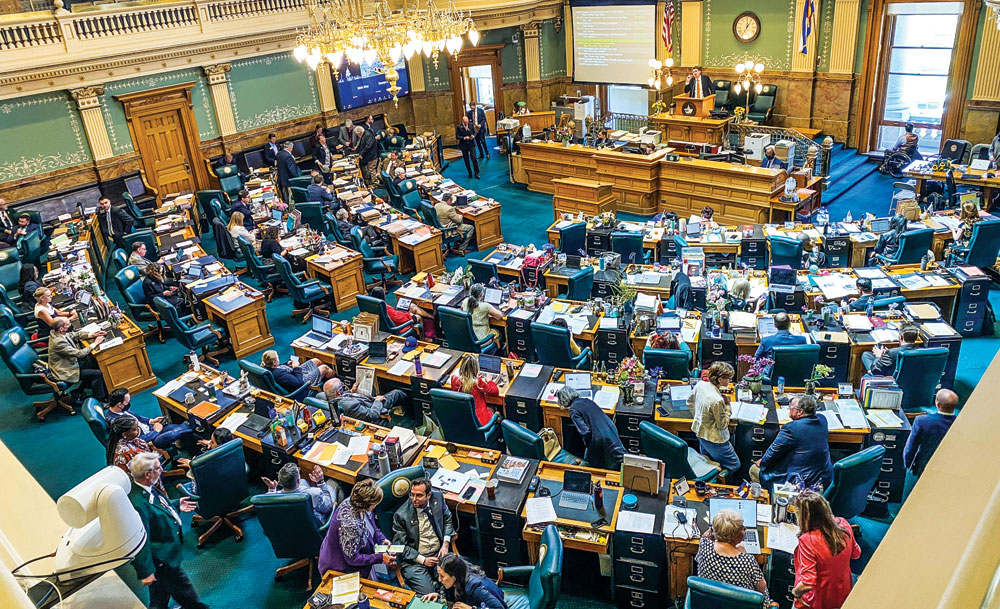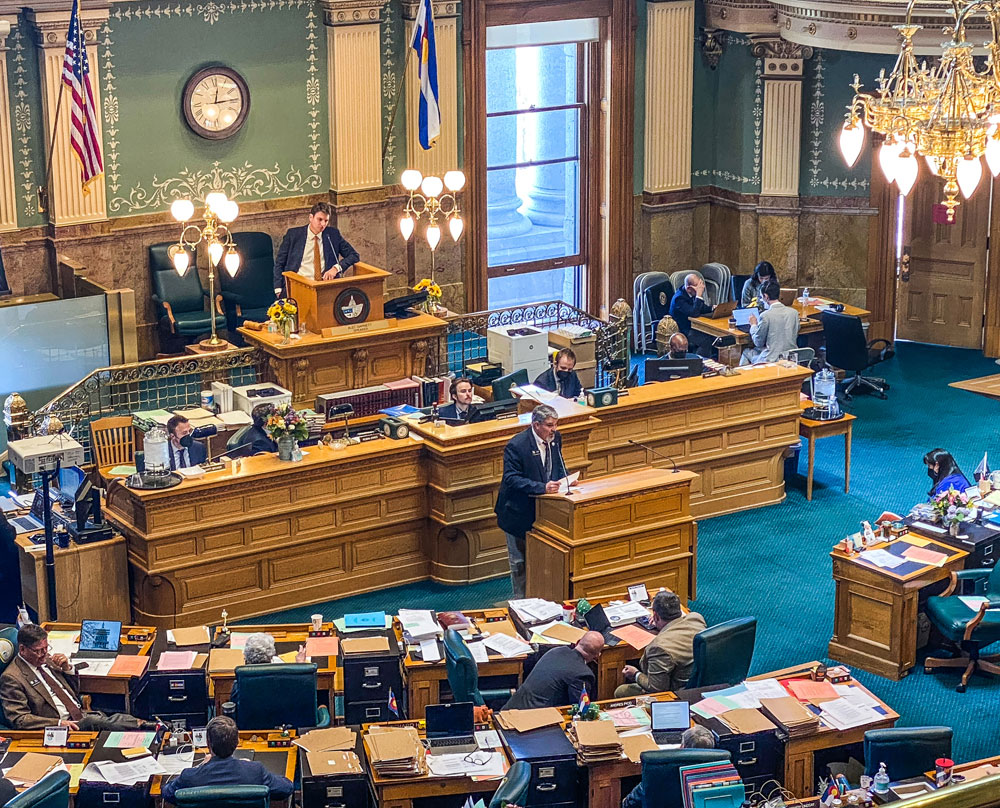
The distinctive gold dome was constructed in the 1890s. It contains real gold leaf, first added in 1908 to commemorate the Colorado Gold Rush.
Democrats Advance Broad Agenda During 2022 Session
Despite some nerve-wracking delays by House Republicans in the legislative session’s final days, majority Democrats went home and into the election season having achieved much of their ambitious 2022 legislative agenda.
Still, the session wasn’t without bumps like a slow start on major bills, plenty of compromises with interest groups and Republicans, internal conflicts among Democratic factions and some behind-the-scenes sparring between legislators and Gov. Jared Polis, who played an active role on many issues.

On May 9, a full House chamber sat for the third read-through of several bills. This session’s issues included: Fetanyl, collective bargaining, regulation of nicotine, abortion, state funding, behavioral health, education, environment and public safety. The second regular session of the 73rd General Assembly adjourned on May 11. The first regular session of the 74th will convene on January 9, 2023.
Top Issues
Fentanyl – Rising crime and overdose rates pushed fentanyl legislation to the top of the legislative agenda.
The fentanyl criminalization and harm reduction (HB 22-1326) bill wasn’t introduced until March 25 and didn’t get settled until after 7pm on the final night of the session, May 11.
The final, much-amended version is complicated but basically sets the prosecution burden of proof for felony fentanyl possession higher than the House wanted but lower than the Senate proposed. The bill also carries $39 million for harm reduction and treatment programs.
Public employee collective bargaining – Top Democratic leaders initially pushed this bill (SB 22-230) as a proposal to allow employees of all local governments and state colleges to unionize. Opposition and lobbying were fierce, and by the time the bill was introduced April 25 it proposed to allow only county employees to unionize. The bill was a focus of Republican delaying tactics in the session’s final days, and it was trimmed further – small counties were exempted – before final passage on the session’s last day.
Regulation of nicotine products – This measure (HB 22-1064) highlighted a clash of progressive priorities, and the power of the governor. The proposed ban on flavored tobacco and vaping products was pushed strongly by a coalition of medical and health groups.
Such a ban was projected to reduce state tobacco tax revenues – some of which are earmarked to pay for the state’s new universal preschool program, which is a Polis pet project. Bowing to an expected veto, a Senate committee killed the bill on the second-to-the-last day of the session.
Abortion – Majority Democrats pushed this measure (HB 22-1279) through quickly and without compromises. It enshrines in state law a woman’s right to choose. It was introduced March 3 and signed into law April 4, well ahead of the leaked U.S. Supreme Court draft decision indicating a possible overturning of the Roe v. Wade decision.
Other Session Highlights
State finances are a major focus of any legislation session, regardless of which party holds the majority. There were four main money issues this session – the main state budget, school funding, use of federal American Rescue Plan Act (ARPA) pandemic relief money and state taxes.

On May 9, Representative Richard Holdorf (R) read a Senate Bill concerning the restoration of the money spent by the state during the pandemic for the state’s unemployment insurance program.
The budget – The total 2022-23 budget includes $37.73 billion from all fund sources for state operations, including $13.72 billion in spending from the tax-supported General Fund, up $1.48 billion (12.1 percent) from 2021-22. Other state revenues come from the federal government and fees. There is a $2.03 billion, 15 percent reserve.
School funding – The annual school finance act, HB 22-1390, reduces the Budget Stabilization Factor to $321.2 million. That’s the mechanism used to trim K-12 funding below what it might be otherwise to keep the overall state budget balanced.
Total K-12 spending, including local funds, will be $8.42 billion, or an average of $9,559 per student. Lawmakers also approved an $80 million increase in state funding for special education students by $80 million.
ARPA spending – The 2021 legislative session put $2.64 billion in federal ARPA money into five special funds for spending by lawmakers in 2022. More than three-dozen bills concerning use of about $2.2 million in ARPA money were passed. Most of the money went to state building maintenance and construction, support for the unemployment insurance fund, behavioral health programs, affordable housing and workforce development and retraining.
Taxes – State revenues have been so strong that tax refunds have been triggered by the constitutional Taxpayer’s Bill of Rights, which sets limits on annual growth in the state spending.
Normally refunds are paid the year after excess revenues are collected. But under a new law refunds of at least $400 for individual tax filers and at least $800 for joint filers will be paid this year, and this autumn’s elections.
Lawmakers also responded to rising property taxes with a bill that temporarily will reduce property taxes by $700 million.
And the legislature approved a variety of suspensions in various taxes and fees, like the licensing fees some professionals pay. One bill postponed a new 2-cent-per-gallon gas fee until April 2023 from July.
The 657 bills introduced during the 2022 sessions covered a wide range of issues. Here’s a brief rundown on legislation that passed in a key areas.
Behavioral health– In addition to spending more than $400 million in ARPA funds on behavioral health programs and initiatives, lawmakers also passed important legislation to create a Behavioral Health Administration, an agency intended to centralize state behavioral health offices.
Education & early childhood – Legislators passed a number of notable education measures, includes ones that restart the state’s district and school rating system (suspended during the pandemic), update the educator evaluation system and provide $52.8 million in stipends for teacher training and other measures to support the educator workforce.
Other measures include a proposal to voters to fund universal free school meals and a grant program to detect and filter lead in school water systems.
The session also approved legislation to set up the Department of Early Childhood, which will run the state’s new universal preschool program.
Environment – Lawmakers approved measures to strengthen regulation of toxic air improve recycling programs and participation, reduce greenhouse gas emissions from, regulate oil and gas drilling liquids and reduce ozone.
Of potential interest to property owners is a bill that will launch a program to encourage replacement of lawns with landscaping that uses less water.
Public safety & crime – While the fentanyl bill was the main focus of debate on public safety, other legislation on this topic also advanced.
Those included grants for youth delinquency prevention, a safer streets grant program enhanced restitution services for crime victims, expanded sealing of criminal records and a community safety grant program for police
The Northeast Denver delegation
Northeast Denver’s five legislators, all Democrats, played important roles in the 2022 session.
Rep. Jennifer Bacon (House District 7) played an active role on several criminal justice reform, education and health-related bills, including the ill-fated proposed ban on flavored nicotine products.
Sen. James Coleman (Senate District 33) was a sponsor on several pandemic recovery, housing and education measures and a prime sponsor of the successful measure to make Juneteenth a state holiday.
Sen. Chris Hansen (Senate District 31) became vice chair of the powerful Joint Budget Committee and was a key player on tax policy, environmental and economic development legislation.
Rep. Leslie Herod (House District 8) also sits on the budget committee and also was active in debates on education in general and school discipline, the fentanyl bill and other criminal justice matters, and equity issues.
Rep. Steven Woodrow (House District 60) was a prime sponsor of several legal and tax issues, plus a bill that will provide grants to local governments for homelessness programs.
Todd Engdahl owns Capitol Editorial Services, a firm that provides legislative coverage, intelligence and analysis to private clients.
Front Porch photos by Christie Gosch


0 Comments